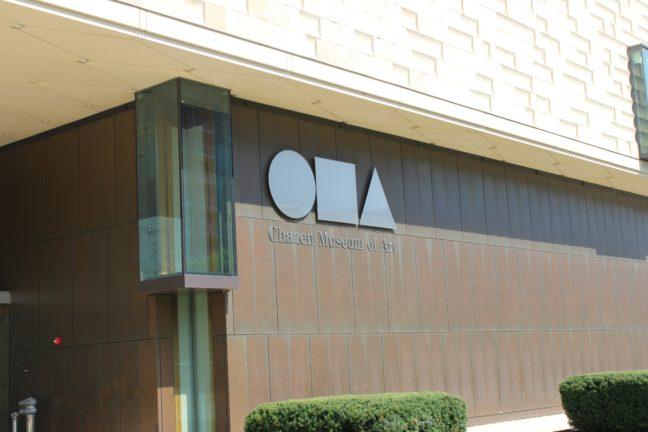The Wisconsin Sea Grant has teamed up with the Chazen Art Museum at the University of Wisconsin to spread awareness on the effects of plastic pollution with an art exhibit.
The exhibit, titled Plastic Entanglements: Ecology, Aesthetics, Materials, is a collection of contemporary artwork with the common theme of plastic.
Starting at the Palmer Museum of Art at Pennsylvania State University, the exhibit is on a nationwide tour which ends at the Chazen. It is a collection of work from both national and international artists, including photography, videography and installations.
The exhibit will remain at the Chazen, with free admission, until Jan. 5, 2020.
According to the Palmer Museum’s website, the exhibit is presented in three sections which represent the timeline of plastic.
“The Archives” is representative of the past. This part of the exhibit examines how the non-biodegradable material leaves behind evidence of human history since its creation.
Kelly Wood, a photographer with work in this section, demonstrates the amount of waste a consumer produces by photographing her garbage for a period of five years. Artists in this section focus on the collection of discarded waste, showing the exponential increase of plastic consumption and disposal, according to the Chazen website.
The senior special librarian at Wisconsin’s Water Library, Anne Moser, has teamed up with the Chazen to further educate visitors on the science behind the art.
“Plastic does not go away — it is a non-biodegradable material that can sit untouched in landfills if not exposed to sunlight,” Moser said. “Future scientists will find the trash we disposed of and it will help to our history.”
Banning straws is insufficient — corporations must do more to tackle climate change
The middle portion of this exhibit is titled “The Entangled Present.” Artwork in this section examines how plastic infiltrates our daily lives. The work also demonstrates the effects of plastic pollution on wildlife in modern times.
Chris Jordan conveys this idea through his photography of a decomposing albatross and his video work, “Camel Gastrolith.” The video features the contents of a camel’s stomach discovered in the Arabian Desert. The contents include over 500 plastic bags, hard plastics, metals and glass.
“This portion shows visitors the effects of plastics in our current time,” Moser said. “The effects of plastic, especially microplastics, are still widely unknown. Our final part of the museum focuses on the future of plastic, how it will change our environment and be used.”
The last section, titled “Speculative Future,” holds pieces that confront the consequences plastic pollution will have on the environment in the future. Canadian artist Kelly Jazvac displayed her collection of hybrid stones that she discovered in Hawaii. As a result of the heat from beach campfires, stones consisting of a mix of debris and beach sediment have been formed.
Christine and Margaret Wertheim also explore plastic’s relationship with the environment through their coral sculptures made entirely of plastic.
The exhibit also has the goal of showing recent innovations in plastics, including 3D printing and molding. Iranian artist and activist Morehshin Allahyari has used the recent invention of 3D printing to create statues. Allahyari fabricates 2000-year-old statues that have been destroyed by ISIS for his project “Material Speculation: ISIS.”
Adrienne Rich, assistant curator of education at the Chazen, has helped to organize an educational program for students to better understand the complex topics they are seeing.
“The Sea Grant has given us the ability to fund schools [to] transport to and from the museum, as well as make the exhibit admission free,” Rich said. “We want kids to also learn from the art, and take away the importance of this exhibit. So far we have had ten school visits, and we hope many more.”
The Chazen recently teamed up with the UW Sea Grant Institute and the Wisconsin Energy Institute to organize the Chazen Art Spin. The event had activities for families to better understand plastic and its effects on the Great Lakes.
UW Sea Grant Institute encourages lake sustainability across Wisconsin
According to the Alliance for the Great Lakes, 22 million pounds of plastic end up in the Great Lakes every year. Researchers have found microplastics while sampling the water in all five Great Lakes.
Being an ecosystem for various types of marine life, the Great Lakes also provide drinking water for 40 million people. According to the AGL, microscopic pieces of plastic have been found in local drinking water, and even beer.
According to the AGL, microplastics are pieces of debris less than five millimeters in length that are a result of plastic degradation. Microbeads, a manufactured polyethylene microplastic, have also been found in health and beauty products such as soaps and toothpaste. These plastics easily pass through filtration systems and have also been found in the Great Lakes and ocean.
Microbeads were banned in 2015 under the Free Waters Act of 2015.
“While it may seem daunting, the issue of plastic is not a completely negative story,” Moser said. “Many great things are being done to combat pollution locally and globally. The artists in this exhibit recognize that and do not have as cynical of a view as you may imagine.”
















